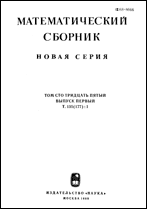|
On sufficient sets in spaces of entire functions of several variables
A. B. Sekerin
Abstract:
The main result is
Theorem 1. {\it Let $D$ be a bounded convex domain in $\mathbf C^n,$ $n\geqslant2,$ with $0\in D$. Let $H(z)=\max_{\lambda\in\overline D}\mathbf{Re}\langle\lambda,z\rangle$. Let $L(z)$ be an entire function of exponential type whose zero set $S$ is the union of planes $P_m=\{z:\langle a_m,z\rangle=c_m\},$ $m\in\mathbf N,$ $|a_m|=1$. Suppose the following conditions hold}:
a) {\it there exist constants $c,$ $r_0,$ $d_0,$ $\gamma\in(0,1),$ such that the estimate
$$
\left|\ln|L(z)|-H(z)\right|\leqslant c\left|\ln d\right||z|^{1-\gamma}
$$
holds if the point $z\in\mathbf C^n,$ satisfies $|z|\geqslant r_0,$ $\inf_{w\in S}|z-w|=d(z,S)\geqslant d>0,$ $d<d_0$};
b) {\it for every $m$ the restriction of the entire function $(\langle a_m,z\rangle-c_m)^{-1}L(z)$ to the plane $P_m$ is not identically zero};
c) {\it there exist constants $c$ and $N$ such that for $m\ne k$ either $d(P_m,P_k)\geqslant c|c_m|^{-N}|c_k|^{-N}$ or $1-|\langle a_m,\overline a_k\rangle|\geqslant c|c_m|^{-N}|c_k|^{-N}$.
Then every analytic function $f(z)$ in the domain $D$ can be represented by a series
$$
f(z)=\sum_{m=1}^\infty\int_{P_m}\exp\langle\lambda,z\rangle\,d\mu_m(\lambda)
$$
converging in the topology of $H(D)$.}
Bibliography: 11 titles.
Received: 27.06.1987
Citation:
A. B. Sekerin, “On sufficient sets in spaces of entire functions of several variables”, Math. USSR-Sb., 64:1 (1989), 263–276
Linking options:
https://www.mathnet.ru/eng/sm1740https://doi.org/10.1070/SM1989v064n01ABEH003306 https://www.mathnet.ru/eng/sm/v178/i2/p260
|


|




 Contact us:
Contact us: Terms of Use
Terms of Use
 Registration to the website
Registration to the website Logotypes
Logotypes








 Citation in format
Citation in format 